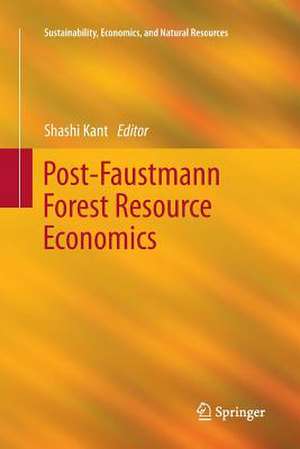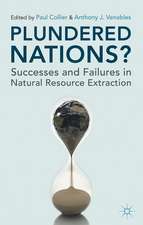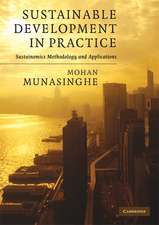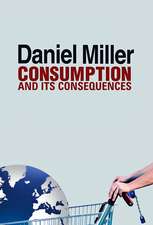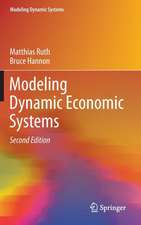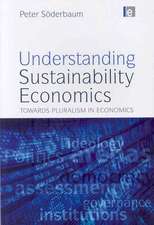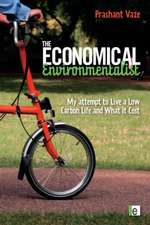Post-Faustmann Forest Resource Economics: Sustainability, Economics, and Natural Resources, cartea 4
Editat de Shashi Kanten Limba Engleză Paperback – 7 mar 2015
| Toate formatele și edițiile | Preț | Express |
|---|---|---|
| Paperback (1) | 945.30 lei 6-8 săpt. | |
| SPRINGER NETHERLANDS – 7 mar 2015 | 945.30 lei 6-8 săpt. | |
| Hardback (1) | 951.29 lei 6-8 săpt. | |
| SPRINGER NETHERLANDS – 9 feb 2013 | 951.29 lei 6-8 săpt. |
Preț: 945.30 lei
Preț vechi: 1152.81 lei
-18% Nou
Puncte Express: 1418
Preț estimativ în valută:
180.89€ • 193.43$ • 150.82£
180.89€ • 193.43$ • 150.82£
Carte tipărită la comandă
Livrare economică 17 aprilie-01 mai
Preluare comenzi: 021 569.72.76
Specificații
ISBN-13: 9789400795679
ISBN-10: 940079567X
Pagini: 312
Ilustrații: XVII, 293 p. 56 illus., 18 illus. in color.
Dimensiuni: 155 x 235 x 17 mm
Greutate: 0.44 kg
Ediția:2013
Editura: SPRINGER NETHERLANDS
Colecția Springer
Seria Sustainability, Economics, and Natural Resources
Locul publicării:Dordrecht, Netherlands
ISBN-10: 940079567X
Pagini: 312
Ilustrații: XVII, 293 p. 56 illus., 18 illus. in color.
Dimensiuni: 155 x 235 x 17 mm
Greutate: 0.44 kg
Ediția:2013
Editura: SPRINGER NETHERLANDS
Colecția Springer
Seria Sustainability, Economics, and Natural Resources
Locul publicării:Dordrecht, Netherlands
Cuprins
1. Post-Faustmann Forest Resource Economics.- Part one: Human behaviour and forest resource economics.- 2. Are Forest User Groups Rational Economic or Social Agents? Experimental Evidence from India.- 3. Complexity Theory and Forest Resource Economics.- 4. Modeling Forest Sector Structural Evolution with the Experience Weighted Attraction Learning (EWA-LITE) Algorithm.- 5. Forest Management and Landowners’ Discount Rates in the Southern United States.- 6. Impatience, Inconsistency, and Institutions to Counter their Effects On Sustainable Forest Management.- Part two: public choice theory and forest resource Economics.- 7. Public Choice, Rent Seeking and the Forest Economics Policy Nexus.- 8. The Political Economy in Forest Policy Making: Economic Efficiency and Beyond.- Part three: systems approaches to forest resource economics.- 9. Economics of Forest Ecosystem Restoration: A Systems Approach.- 10. Economics of Multiple Forest Values and Life Cycle Analysis.- Part four: incrementalist approaches to forest resource economics.- 11. Economic Modeling in Forestry: Avoiding Lucas Critique.- 12. Multiple Forest Stocks and Harvesting Decisions: The Enhanced Green Golden Rule.- 13. Land Expectation Value to Profit Maximization: Re-examination of Faustmann Formula.- Index.
Textul de pe ultima copertă
One of the first on the topic, this book offers 21st century alternatives to the 163 year-old paradigm at the heart of forest resource economics, the Faustmann Formulation of land expectation value. Since that time, many new streams of economics – including agent-based economics, behavioral economics, complexity theory, ecological economics, evolutionary game theory, social choice theory and public choice theory – have extended the horizons of economic thinking far beyond the limits of neoclassical economics. Today, the role of multiple forest ecosystem services in climate change, human health, environmental sustainability and human development is increasingly recognized, and attention turns to enhancing the contribution of forests to a “green” economy rather than the traditional contribution of forests to a blue (industrial) economy.
The fourth volume in the Sustainability, Economics and Natural Resources series, Post-Faustmann Forest Resource Economics (PFFRE) focuses on the new paradigm of forest economics. The first chapter lays the foundation of the PFFRE, presenting the key distinctions between the FFRE and the PFFRE. Twelve following chapters address issues related to forest economics from perspectives different than the FFRE. Chapters 2 to 6 discuss issues related to human behavior that is different than the traditional “rational economic man,” Chapters 7 and 8 examine public choice theory, Chapters 9 and 10 present systems approaches, and Chapters 11 to 13 describe incremental approaches for incorporating new features in the FFRE.
The fourth volume in the Sustainability, Economics and Natural Resources series, Post-Faustmann Forest Resource Economics (PFFRE) focuses on the new paradigm of forest economics. The first chapter lays the foundation of the PFFRE, presenting the key distinctions between the FFRE and the PFFRE. Twelve following chapters address issues related to forest economics from perspectives different than the FFRE. Chapters 2 to 6 discuss issues related to human behavior that is different than the traditional “rational economic man,” Chapters 7 and 8 examine public choice theory, Chapters 9 and 10 present systems approaches, and Chapters 11 to 13 describe incremental approaches for incorporating new features in the FFRE.
Caracteristici
Offers a thorough critique of the dominant paradigm of forest economics – Faustmann Forest Economics Proposes more advanced economic perspectives on forest resource economics, including sustainability, complexity, and human behavior Applies cutting-edge experimental methods and systems approaches to forest resource economics Includes supplementary material: sn.pub/extras
